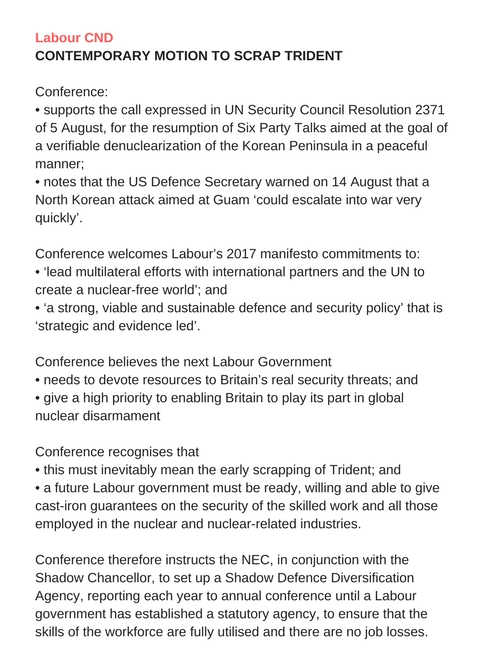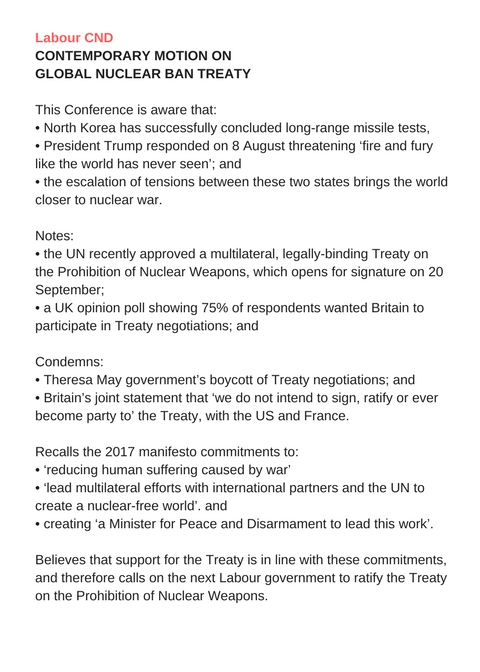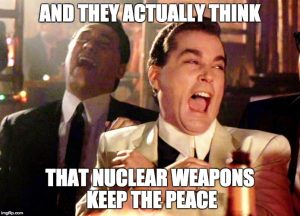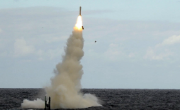In recent months a number of CLPs have held discussions on Trident ahead of the policy review which will be undertaken by the Labour Party this year. You can see a selection of the motions which have been passed.
If your CLP would like a Labour CND speaker for a meeting on Trident, or if a motion is passed, please let us know by emailing info@labourcnd.org
East Devon CLP
East Devon Constituency Labour Party is opposed to the renewal of Trident
Richmond Park CLP
This CLP is in favour of scrapping the Trident Missile System and not replacing it
Tamworth CLP
This CLP believes that the Labour Party should oppose the replacement of the Trident nuclear missile system
Brent Central CLP
This meeting agrees that Trident should not be renewed
Birkenhead CLP
We call upon the next Labour government to scrap Trident due to the high cost, and the danger of maintaining it.
Littleborough & Lakeside Branch (part of Rochdale CLP)
This meeting notes that the projected replacement of the Trident Nuclear Missile system:
- Is set to cost ?167, 000, 000,000 at a time when Conservative austerity measures are depriving our local authority of the resources to pay for much needed and valued services,
- Will not address the real security challenges to this country such as climate change, terrorism or cyber attacks,
- Is a first strike, not defensive, weapon of mass destruction, incapable of distinguishing between civilian and military targets and whose effects will devastate this country as well as any enemy against which it is used,
- Is neither independent from the US nor a deterrent to warfare and serves only to maintain the illusion of power,
- Is illegal in that its effects are genocidal and therefore it contravenes the Geneva Convention. Renewing it would breach our commitment to the Non-Proliferation Treaty which the UK has signed and ratified.
This meeting resolves therefore to declare its opposition to the renewal of the Trident system and calls on the government to dedicate some of the resources saved by cancelling its renewal to be used to stimulate employment opportunities for those who would lose their jobs.
The meeting also calls on the Rochdale Constituency Labour Party to endorse this resolution and to recommend that it is adopted by the Party as part of its review of the national defence policy.
Hackney North and Stoke Newington CLP
This General Meeting notes:
- The current Government’s commitment to replace the existing Trident nuclear weapons system at a cost conservatively estimated at ?100 billion over a period of more than four decades. Indeed, the Tory chair of the Foreign Affairs Select Committee, Crispin Blunt MP, has suggested a figure exceeding ?165 billion.
- The likelihood of a parliamentary vote in 2016 on authorisation of a Trident replacement.
- The demonstration called by Campaign for Nuclear Disarmament (CND) and numerous civil society organisations for Saturday 27 February 2016 in opposition to Trident renewal.
This General Meeting believes:
- Trident and similar ‘weapons of mass destruction’ do nothing to enhance the security of the population resident in Britain, especially in a post-Cold War world.
- The expenditure of billions of pounds on a new, extraordinarily expensive weapons system is especially objectionable against a background of remorseless cuts in social welfare spending and most other areas of public expenditure.
- The campaign pledge from Labour Party leader Jeremy Corbyn to develop a Defence Diversification Agency policy to ensure socially useful, skilled employment for those workers in industries currently tied into the production of nuclear weapons and delivery system.
This General Meeting therefore resolves to publicise the 27 February demonstration to members and make sure the Hackney North CLP banner is present on the march; and copy this motion to our MP and the National Executive Committee.
Hackney North and Stoke Newington CLP
The General Meeting is against the renewal of the Trident system as it is not a deterrent; and because it makes no moral, practical or economic sense.






